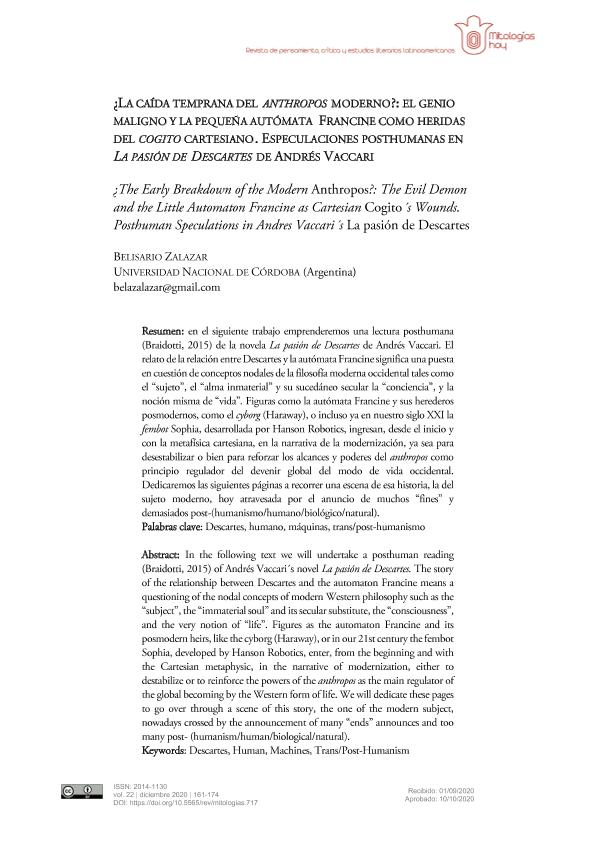Artículo
En el siguiente trabajo emprenderemos una lectura posthumana (Braidotti, 2015) de la novela La pasión de Descartes de Andrés Vaccari. El relato de la relación entre Descartes y la autómata Francine significa una puesta en cuestión de conceptos nodales de la filosofía moderna occidental tales como el “sujeto”, el “alma inmaterial” y su sucedáneo secular la “conciencia”, y la noción misma de “vida”. Figuras como la autómata Francine y sus herederos posmodernos, como el cyborg (Haraway), o incluso ya en nuestro siglo XXI la fembot Sophia, desarrollada por Hanson Robotics, ingresan, desde el inicio y con la metafísica cartesiana, en la narrativa de la modernización, ya sea para desestabilizar o bien para reforzar los alcances y poderes del anthropos como principio regulador del devenir global del modo de vida occidental. Dedicaremos las siguientes páginas a recorrer una escena de esa historia, la del sujeto moderno, hoy atravesada por el anuncio de muchos “fines” y demasiados post-(humanismo/humano/biológico/natural). En el següent treball emprendrem una lectura posthumana (Braidotti, 2015) de la novel·la La pasión de Descartes d'Andrés Vaccari. El relat de la relació entre Descartes i l'autòmat Francine significa un qüestionament de conceptes nodals de la filosofia moderna occidental (fundats segons la vulgata tradicional pel mateix Descartes) com ara el “subjecte”, l’“ànima immaterial” i el seu succedani secular, la “consciència”, i, en darrer terme, però no menys important, la noció mateixa de “vida”. Figures com l'autòmat Francine i els seus hereus postmoderns, com el cíborg (Haraway), o fins i tot ja en el nostre segle XXI la fembot Sophia, desenvolupada per Hanson Robotics, ingressen, des de l'inici i amb la metafísica cartesiana, en la narrativa de la modernització, sigui per desestabilitzar o bé per reforçar l'abast i poders de l’anthropos com a principi regulador de l'esdevenir global del mode de vida occidental. Dedicarem les següents pàgines a recórrer una escena d'aquesta història, la del subjecte modern, avui travessada per l'anunci de molts “fins” i massa post-(humanisme/humà/biològic/natural). In the following text we will undertake a posthuman reading (Braidotti, 2015) of Andrés Vaccari´s novel La pasión de Descartes. The story of the relationship between Descartes and the automaton Francine means a questioning of the nodal concepts of modern Western philosophy such as the “subject”, the “immaterial soul” and its secular substitute, the “consciousness”, and the very notion of “life”. Figures as the automaton Francine and its posmodern heirs, like the cyborg (Haraway), or in our 21st century the fembot Sophia, developed by Hanson Robotics, enter, from the beginning and with the Cartesian metaphysic, in the narrative of modernization, either to destabilize or to reinforce the powers of the anthropos as the main regulator of the global becoming by the Western form of life. We will dedicate these pages to go over through a scene of this story, the one of the modern subject, nowadays crossed by the announcement of many “ends” announces and too many post- (humanism/human/biological/natural).
¿La caída temprana del anthropos moderno?: El genio maligno y la pequeña autómata Francine como heridas del cogito cartesiano. Especulaciones poshumanas en La pasión de Descartes de Andrés Vaccari
Título:
La caiguda prematura de l’anthropos modern?: El geni maligne i la petita autòmat Francine com a ferides del cogito cartesià. Especulacions posthumanes a La pasión de Descartes d'Andrés Vaccari;
The Early Breakdown of the Modern Anthropos?: The Evil Demon and the Little Automaton Francine as Cartesian Cogito´s Wounds. Pos-thuman Speculations in Andres Vaccari´s La pasión de Descartes
The Early Breakdown of the Modern Anthropos?: The Evil Demon and the Little Automaton Francine as Cartesian Cogito´s Wounds. Pos-thuman Speculations in Andres Vaccari´s La pasión de Descartes
Fecha de publicación:
12/2020
Editorial:
Univversidad Autónoma de Barcelona
Revista:
Mitologías Hoy
e-ISSN:
2014-1130
Idioma:
Español
Tipo de recurso:
Artículo publicado
Clasificación temática:
Resumen
Palabras clave:
Descartes
,
Humano
,
Máquinas
,
Trans/posthumanismo
Archivos asociados
Licencia
Identificadores
Colecciones
Articulos(CCT - CORDOBA)
Articulos de CTRO.CIENTIFICO TECNOL.CONICET - CORDOBA
Articulos de CTRO.CIENTIFICO TECNOL.CONICET - CORDOBA
Citación
Zalazar, Belisario; ¿La caída temprana del anthropos moderno?: El genio maligno y la pequeña autómata Francine como heridas del cogito cartesiano. Especulaciones poshumanas en La pasión de Descartes de Andrés Vaccari; Univversidad Autónoma de Barcelona; Mitologías Hoy; 22; 12-2020; 161-174
Compartir
Altmétricas




